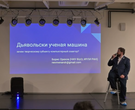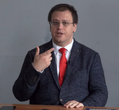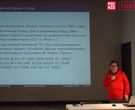- A
- A
- A
- АБB
- АБB
- АБB
- А
- А
- А
- А
- А
- Национальный исследовательский университет «Высшая школа экономики»
- Факультет гуманитарных наук
- Школа лингвистики
- Новости
- Доклад Джеффа Паркера на научном семинаре Школы лингвистики
-
Школа
- О школе
- Сотрудники
- Семинары
-
Исследовательские подразделения
-
- Международная лаборатория языковой конвергенции
- Центр «Русский как иностранный»
- Центр цифровых гуманитарных исследований
- Центр языка и мозга
- Лаборатория по формальным моделям в лингвистике
- Лаборатория «Корпусные исследования»
- Лаборатория языков Кавказа
- Лаборатория учебных корпусов
- Лаборатория теоретической и полевой фольклористики
- Лаборатория социогуманитарных исследований Севера и Арктики
-
-
Проекты
-
Проекты сотрудников
-
Проекты студентов и аспирантов
-
Завершённые проекты
- Некомпозициональные конструкции в эритажном русском
- Компьютерные и лингвистические ресурсы для поддержки шугнанского языка
- Лингвоспецифическая разметка китайских текстов в Русско-китайском параллельном корпусе НКРЯ
- Цифровой архив: создание корпуса журнала "Отечественные записки"
- Создание лингвокультурологического подкаста о России для иностранцев «Yellow Blue Bus» (Я люблю вас)
- База данных русских идиом
- Компьютерные и корпусные инструменты для иранистических исследований
- Русский разговорный клуб
- Шугнанские глаголы в типологическом освещении
- Создание академического онлайн-словаря персидского языка
-
- Международное сотрудничество
- Экспедиции
- Ресурсы
- Препринты
- Наша книжная полка
-
Образовательные программы
- Бакалаврская программа «Фундаментальная и компьютерная лингвистика»
- Магистерская программа «Компьютерная лингвистика»
- Магистерская программа «Лингвистическая теория и описание языка»
- Магистерская программа «Русский как иностранный во взаимодействии языков и культур»
- Магистерская программа «Цифровые методы в гуманитарных науках»
- Аспирантская школа по филологическим наукам
Адрес: 105066, г. Москва,
Старая Басманная ул., д. 21/4
Телефон: +7 (495) 772-95-90 доб. 22734
E-mail: ling@hse.ru
Редакторы сайта — Наталья Борисовна Пименова, Максим Олегович Бажуков, Константин Евгеньевич Сатдаров
- Международная лаборатория языковой конвергенции
- Лаборатория «Корпусные исследования»
- Лаборатория по формальным моделям в лингвистике
- Лаборатория языков Кавказа
- Лаборатория социогуманитарных исследований Севера и Арктики
- Научно-учебная лаборатория учебных корпусов
- Центр «Русский как иностранный»
- Научно-учебные группы
- Каталог проектов по компьютерной лингвистике
- Проекты, поддерживаемые грантами
- Русский язык для всех
- Лингвистический кружок для школьников
- Лингвистика в Центре открытого образования
Школа лингвистики была образована в декабре 2014 года. Сотрудники школы преподают на образовательных программах по теоретической и компьютерной лингвистике в бакалавриате и магистратуре. Лингвистика, которой занимаются в школе, — это не только знание иностранных языков, но прежде всего наука о языке и о способах его моделирования. Научные группы школы занимаются исследованиями в области типологии, социолингвистики и ареальной лингвистики, корпусной лингвистики и лексикографии, древних языков и истории языка. Кроме того, в школе создаются лингвистические технологии и ресурсы: корпуса, обучающие тренажеры, словари и тезаурусы, технологии для электронного представления текстов культурного наследия.
В печати
Nasledskova P., Netkachev I.
Studies in Language. 2026. P. 1-44.
В печати
Lander Y., Bagirokova I., Lander A.
In bk.: Theoretical Issues in the Languages of the Caucasus. Amsterdam: John Benjamins, 2026.
arxiv.org. Computer Science. Cornell University, 2024

Доклад Джеффа Паркера на научном семинаре Школы лингвистики
Джефф Паркер (Jeffrey Parker) — сотрудник Университета Бригема Янга (США), специалист в области морфологии и корпусной лингвистики. Его доклад был посвящён словоизменительным классам на примере русских существительных.
Авторская аннотация доклада:
Inflection classes persist as a part of the structure of languages even though they fulfill no communicative function. In this talk I give an overview of my previous and ongoing research about the complexity of inflection class systems and how that complexity affects language processing. Using Russian nouns, I show that the organization of an inflection class system can minimize the difficulty of predicting both regular and irregular inflection, but also show that across languages inflection class systems exhibit significant differences in the importance of such organization. I show that different patterns of syncretism across inflection classes have effects in lexical access and representation that may be connected to form predictability, and present ongoing work about how ambiguities of form and function affect processing words in different contexts. Together, this research suggests that inflection class systems are not arbitrary irregularities in language but that they exhibit systematic organization that has consequences for language users.
На этом научный семинар Школы лингвистики завершает свою работу в текущем академическом году и возобновит заседания осенью.
- О ВЫШКЕ
- Цифры и факты
- Руководство и структура
- Устойчивое развитие в НИУ ВШЭ
- Преподаватели и сотрудники
- Корпуса и общежития
- Закупки
- Обращения граждан в НИУ ВШЭ
- Фонд целевого капитала
- Противодействие коррупции
- Сведения о доходах, расходах, об имуществе и обязательствах имущественного характера
- Сведения об образовательной организации
- Людям с ограниченными возможностями здоровья
- Единая платежная страница
- Работа в Вышке
- ОБРАЗОВАНИЕ
- Лицей
- Довузовская подготовка
- Олимпиады
- Прием в бакалавриат
- Вышка+
- Прием в магистратуру
- Аспирантура
- Дополнительное образование
- Центр развития карьеры
- Бизнес-инкубатор ВШЭ
- Образовательные партнерства
- Обратная связь и взаимодействие с получателями услуг
-
http://www.minobrnauki.gov.ru/
Министерство науки и высшего образования РФ
-
https://edu.gov.ru/
Министерство просвещения РФ
-
http://www.edu.ru
Федеральный портал «Российское образование»
-
https://elearning.hse.ru/mooc
Массовые открытые онлайн-курсы
- © НИУ ВШЭ 1993–2026 Адреса и контакты Условия использования материалов Политика конфиденциальности Карта сайта
- Редактору
















































